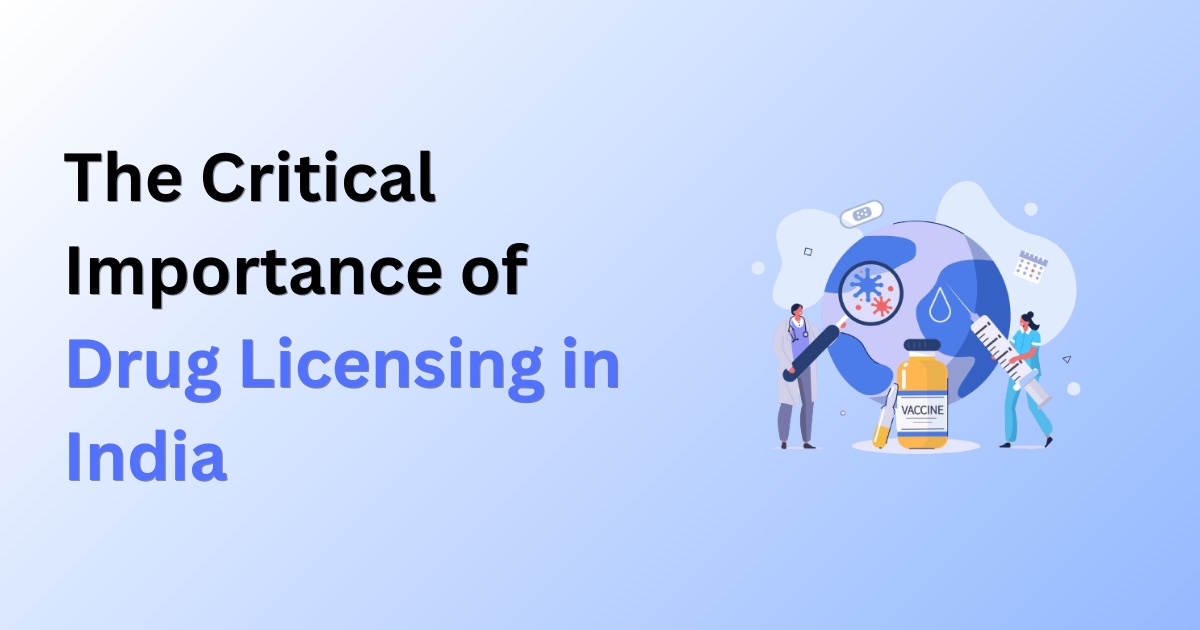Introduction:
In the dynamic landscape of India's pharmaceutical sector, the intricate web of regulations and oversight encapsulates a pivotal guardian—drug licensing. This article embarks on an exploration of why drug licensing is not just a bureaucratic formality but a linchpin safeguarding public health, ensuring drug safety, and fostering industry integrity.
Regulatory Framework
In the intricate tapestry of India's pharmaceutical domain, a robust regulatory framework serves as the compass, steering the industry toward safety, quality, and compliance. This article embarks on a detailed exploration of the regulatory framework governing pharmaceuticals in India, unraveling the layers of entities, legal foundations, and standards that constitute the vigilant guardianship of public health.
Ensuring Drug Safety and Efficacy
In the realm of pharmaceuticals, the commitment to ensuring the safety and efficacy of drugs stands as an unwavering cornerstone. This article delves into the meticulous processes and stringent measures that constitute the essence of drug safety and efficacy, highlighting their pivotal role in safeguarding public health and fostering trust in the pharmaceutical landscape.
Public Health Protection
Public health protection is a multifaceted and comprehensive approach aimed at preserving and improving the health of entire populations. It involves the systematic application of preventive measures, interventions, and policies to safeguard communities from health risks and promote overall well-being. This concept encompasses various aspects, each contributing to the collective goal of creating healthier and more resilient societies.
Disease Prevention and Control:
- Immunization Programs: Implementing widespread vaccination initiatives to prevent the spread of infectious diseases and protect community immunity.
- Disease Surveillance: Monitoring and analyzing health data to detect and control the outbreak of diseases promptly.
Environmental Health:
- Safe Water and Sanitation: Ensuring access to clean and safe drinking water and proper sanitation to prevent waterborne diseases.
- Air Quality Management: Implementing measures to reduce air pollution and minimize respiratory health risks.
Health Education and Promotion:
- Community Outreach Programs: Educating communities on healthy lifestyles, disease prevention, and access to healthcare resources.
- Promotion of Healthy Behaviors: Encouraging habits such as regular exercise, a balanced diet, and smoking cessation to enhance overall health.
Emergency Preparedness and Response:
- Disaster Management: Developing plans and protocols to address public health challenges during emergencies or natural disasters.
- Pandemic Preparedness: Anticipating and preparing for potential health crises, as seen in the context of infectious disease outbreaks.
Accessible Healthcare Services:
- Healthcare Infrastructure: Building and maintaining healthcare facilities that provide accessible and quality services to communities.
- Healthcare Equity: Ensuring that all individuals, regardless of socioeconomic status, have equitable access to healthcare resources.
Regulatory Oversight:
- Food and Drug Safety: Implementing regulations to ensure the safety and quality of food and pharmaceutical products.
- Occupational Health Standards: Establishing guidelines to protect workers from occupational hazards and promote a safe working environment.
Mental Health Promotion:
- Mental Health Awareness: Raising awareness about mental health issues and reducing the stigma associated with seeking mental health support.
- Access to Mental Health Services: Ensuring that mental health services are readily available and accessible to those in need.
Collaborative Partnerships:
- International Cooperation: Engaging in collaborative efforts with other countries and global health organizations to address cross-border health challenges.
- Community Engagement: Involving communities in decision-making processes to tailor public health interventions to local needs.
Research and Innovation:
- Medical Research: Conducting research to advance medical knowledge and develop innovative solutions for public health challenges.
- Technology Adoption: Harnessing technological advancements to improve disease surveillance, healthcare delivery, and health information dissemination.
Quality Control and Standardization
Quality control and standardization are integral components of any industry dedicated to delivering products or services. In the context of manufacturing and production, these principles form the bedrock, ensuring that products meet specified criteria, adhere to established standards, and consistently deliver excellence. Let's delve into the essence of quality control and standardization and understand their significance across various sectors.
Quality Control: Precision in Every Detail
- Definition: Quality control is a systematic process that ensures products meet defined standards and customer expectations.
- Key Components:
- Inspection and Testing: Rigorous examination and testing of raw materials, components, and final products to identify defects.
- Process Monitoring: Continuous surveillance of production processes to maintain consistency and identify deviations.
- Quality Assurance: Proactive measures to prevent defects before they occur, emphasizing process improvement.
Standardization:
- Definition: Standardization involves developing and implementing guidelines, specifications, and protocols to ensure uniformity and consistency in processes, products, or services.
- Key Components:
- Specifications: Clearly defined criteria and requirements for products or processes.
- Regulatory Compliance: Adherence to industry or international standards to meet legal and safety requirements.
- Interoperability: Facilitating compatibility and seamless integration between different systems, products, or services.
Importance in Manufacturing
- Consistent Quality: Quality control ensures that every product leaving the manufacturing line meets the same high standards.
- Efficiency: Standardization streamlines processes, reducing variations and optimizing efficiency.
- Customer Satisfaction: Consistent quality and adherence to standards contribute to customer trust and satisfaction.
Role in Pharmaceuticals
- Drug Safety: Quality control ensures that pharmaceutical products are free from contaminants and meet safety standards.
- Efficacy: Standardization in drug manufacturing ensures that each dose delivers the intended therapeutic effect.
Food Industry:
- Nutritional Content: Quality control verifies that food products meet nutritional specifications.
- Safety Standards: Standardization ensures compliance with hygiene and safety regulations in food production.
Automotive Sector:
- Component Quality: Quality control in manufacturing ensures that each automotive component meets specifications.
- Standardized Parts: Standardization facilitates the interchangeability of parts, contributing to the efficiency of assembly lines.
Technology and Electronics:
- Interoperability: Standardization in software and hardware ensures compatibility between different devices.
- Reliability: Quality control measures prevent defects in electronic components, ensuring the reliability of electronic products.
Continuous Improvement:
- Feedback Loops: Quality control incorporates feedback mechanisms to identify areas for improvement.
- Upgradation of Standards: Standardization evolves to incorporate technological advancements and changing industry needs.
Combating Counterfeit Drugs
The proliferation of counterfeit drugs poses a grave threat to public health worldwide, jeopardizing patient safety, eroding trust in healthcare systems, and funding criminal enterprises. Combating counterfeit drugs requires a concerted effort from regulatory bodies, pharmaceutical manufacturers, healthcare professionals, and the public. In this context, we explore the multifaceted strategies employed to safeguard the integrity of pharmaceuticals and protect consumers from the dangers of counterfeit medications.
Market Credibility and Industry Integrity
In the dynamic landscape of commerce, market credibility and industry integrity are not mere buzzwords; they are the bedrock upon which enduring businesses thrive. This article delves into the essence of market credibility and industry integrity, exploring their significance in fostering trust, sustaining growth, and ensuring the long-term success of businesses across diverse sectors.
Access to Global Markets
Drug licensing is not confined within national borders; it acts as a gateway for Indian pharmaceutical companies seeking global recognition. By adhering to stringent licensing standards, companies enhance their competitiveness on the international stage.
Legal Compliance and Risk Mitigation
Operating without proper drug licenses not only violates legal norms but also poses severe risks. This section addresses the legal consequences and potential penalties associated with non-compliance, underlining the importance of adherence to licensing requirements.
Conclusion
Drug licensing emerges not just as a regulatory necessity but as a profound commitment to public well-being. It stands as a sentinel, guarding against potential risks, ensuring quality healthcare, and upholding the integrity of the pharmaceutical industry. As we navigate through the intricacies of drug licensing, the conclusion echoes the continuous importance of robust licensing processes for the health and well-being of the population—a commitment that resonates far beyond legal formalities.


No comments yet